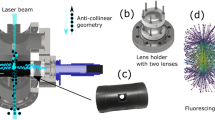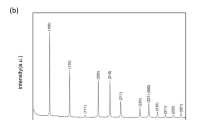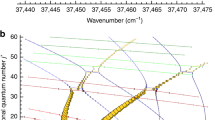Abstract
LEAD carbonate, PbCO3, crystallizes in the potassium nitrate structure, space group D162h, with four molecules per unit cell1. From crystallographic considerations, it follows that the carbonate ion occupies a site in the lattice of which the symmetry is Cs. The degeneracies of ν3 and ν4 are removed by the perturbing crystalline field, and all the vibrational modes are active in the infra-red.
This is a preview of subscription content, access via your institution
Access options
Subscribe to this journal
Receive 51 print issues and online access
$199.00 per year
only $3.90 per issue
Buy this article
- Purchase on Springer Link
- Instant access to full article PDF
Prices may be subject to local taxes which are calculated during checkout
Similar content being viewed by others
References
Landolt-Börnstein, Zahlenwerte und Funktionen, 4 (Springer Verlag, 1955).
Haas, C., thesis, Amsterdam (1956). Shultin, A. A., Dokl. Akad. Nauk S.S.S.R., 125, 767 (1959) assigns the bans in NaNO3 to a component of Davydov splitting of the ν2 mode. This assignment is not in agreement with the temperature-dependence of the intensity which he finds.
Author information
Authors and Affiliations
Rights and permissions
About this article
Cite this article
SCHUTTE, C., BUIJS, K. A Difference Band of a Fundamental and a Lattice Mode in the Infra-red Spectra of Lead and Other Carbonates. Nature 192, 351–352 (1961). https://doi.org/10.1038/192351a0
Issue Date:
DOI: https://doi.org/10.1038/192351a0
Comments
By submitting a comment you agree to abide by our Terms and Community Guidelines. If you find something abusive or that does not comply with our terms or guidelines please flag it as inappropriate.



